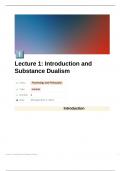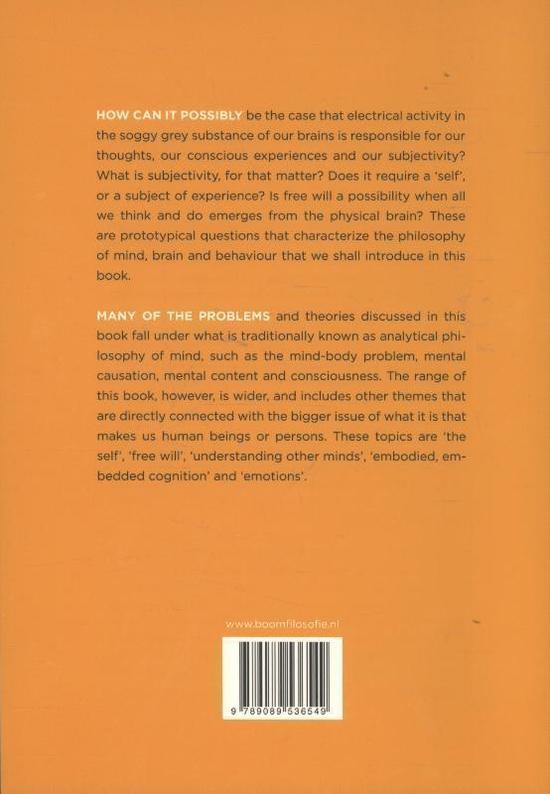1️⃣
Lecture 1: Introduction and
Substance Dualism
Class Psychology and Philosophy
Type Lecture
Number 1
Date @September 5, 2023
Introduction
Lecture 1: Introduction and Substance Dualism 1
, Mind-Body Problem
SSA - Lecture 1
1. The mind-body problem is a fundamental question in philosophy that concerns the
relationship between the mind (mental processes, consciousness) and the body
(physical processes, brain). It arises from the apparent disconnect between the
mental and physical aspects of human existence — The question is how these two
seemingly different aspects interact, if at all, and whether they are separate or
interconnected.
Definition of Mind
The term ‘mind’ will be used here as an umbrella-term. It does not
necessarily refer to one thing. Rather, it refers to a range of
processes and states that we commonly refer to as ‘mental’, such
as thinking, having beliefs and desires, perceiving, being
Lecture 1: Introduction and Substance Dualism 2
, conscious, experiencing emotions, and forming and acting on
intentions.
—> The mind = a domain of thinking “me” that is separated from the outside world, but
connected to the world through senses & behavior.
Substance Dualism
Idealism: is everything that exists in the mind
Materialism: Everything that exists is matters
(or is mind-dependent)
Monism: Everything is made out of the same Dualism: The mind and matter are two different
substance substances.
💡 Substance dualists typically argue that the mind and the body are
composed of different substances and that the mind is a thinking thing that
lacks the usual attributes of physical objects: size, shape, location, solidity,
motion, adherence to the laws of physics, and so on.
→ Substance is a fundamental building block of reality.
Humans consist of two substances: An immaterial soul and a material body.
Mind and Body are two different substances: two different “building blocks” of reality
that can in principle exist independently, but they have a continuous interaction.
Assumption: Since they are made out of different properties, they cannot be
considered the same thing.
Arguments for Substance Dualism:
Lecture 1: Introduction and Substance Dualism 3
, 1. Leibniz’ Law: The Identity of Indiscernibles
X = Y can only occur, if they are composed of the exact same properties.
Assumption: Based on this law, since they are made out of different properties,
they cannot be considered the same thing
E.g. two similar billiard balls (look exactly the same), however, they are not identical,
because they do not share the same place in space and time! So even though
visually they are entirely the same, they both have several unique individual
properties.
This is why the mind cannot be doubted, but the body can:
⭐ We cannot deny the fact that we aren’t thinking because the “doubt”
requires thinking. While we try to understand this concept, we are already
thinking.
2. Rationality, language, consciousness
Something physical is not conscious, cannot reason or use language
3. Cogito ergo sum – I think, therefore I am
Descartes claims that we can doubt the existence of our own bodies and brains, but
that we cannot doubt our own existence as thinking things.
→ Therefore, these thinking things (which would be the mind) have a property that our
bodies lack, so according to Leibniz’s principle, this shows that mind and body must
be distinct entities.
So, for dualism:
Lecture 1: Introduction and Substance Dualism 4





